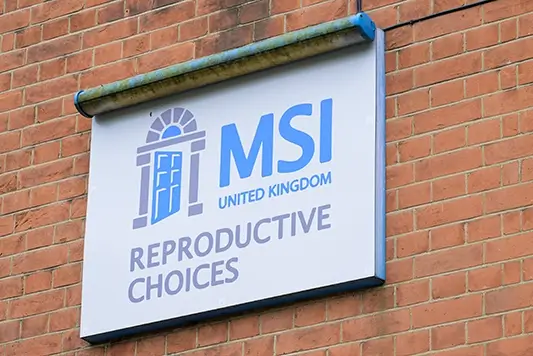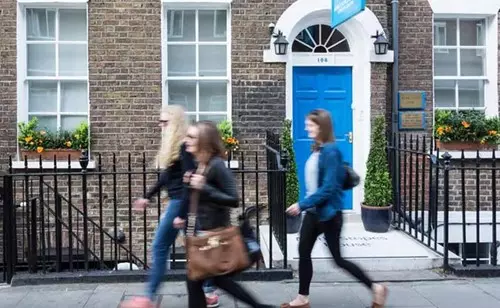In February, a BBC Panorama documentary investigated the existence of ‘crisis pregnancy centres’ in the UK. Often disguised as impartial organisations who aim to support those considering their pregnancy options, these anti-choice groups are in fact spreading dangerous misinformation about abortion, and attempting to dissuade women and pregnant people from accessing abortion care.
In this blog, we explore crisis pregnancy centres, debunk some of the common myths about abortion spread by anti-choice groups in the UK, and share what to look out for online when searching for legitimate and impartial abortion and pregnancy advice.
What is a crisis pregnancy centre?
A ‘crisis pregnancy centre’ is a centre established by an anti-choice organisation with the aim of dissuading women and pregnant people from accessing abortion care.
What do we mean when we describe an individual or organisation as ‘anti-choice’?
Sometimes referred to as ‘pro-life’ or anti-abortion, someone who is anti-choice opposes the right to have an abortion. As the International Planned Parenthood Federation explains in their guide on how to talk about abortion in an accurate and non-stigmatising way, the term ‘anti-choice’ is a more accurate way of describing someone opposed to abortion than ‘pro-life’, since ‘pro-life implies that those who support legal abortion access are ‘anti-life’, which is inaccurate’.
Whilst the anti-choice groups who run crisis pregnancy centres often present themselves as offering impartial advice and quality information, they are in fact biased, coercive and wholly unqualified to offer support to those looking for pregnancy and abortion support. These centres are often modelled on and funded by anti-choice groups in the US whose aim is to stop people from choosing to have an abortion and making whatever decision is right for them.
As Dr Jonathan Lord, Medical Director at MSI UK, explained to the BBC as part of a Panorama documentary investigating crisis pregnancy centres in the UK: “These centres are set up to target women who are struggling and give them false advice to try to sway them away from an abortion.
[…] They risk causing significant harm and damage to those clients who are especially vulnerable.”
One tactic employed by crisis pregnancy centres is to mislead and lie to people about their stage of pregnancy, in order to manipulate them into not accessing care while they can. Another is pressuring people into having an ultrasound even when there is no medical need for one. Anti-choice groups claim that pressuring people into having a scan is about informed consent. The option of a scan is available for those who want one, but usually, it has no impact on the decision to have an abortion. A Wisconsin study published by PLOS in 2017 found that “the majority of women were certain of their abortion decision and the law [compelling a forced scan] did not change their decision”, while a 2014 study from the Embryo Society found that “viewing an ultrasound image of the fetus has little to no effect on their decision to have an abortion.” Scans add unnecessary barriers and can feel stigmatising or emotionally manipulative, but they do not provide useful information for decision-making. It is dishonest to claim otherwise.
Another common tactic is spreading harmful misinformation about abortion and ‘abortion side effects’. For example, as was shown in the BBC Panorama documentary, crisis pregnancy centres often spread false medical information about fertility following an abortion, the side effects of abortion pills like pain and bleeding, and how someone will feel following an abortion.
In the next section of this blog, we will debunk some of the myths and misinformation spread by anti-choice organisations about abortion care.
It is important to note that crisis pregnancy centres aren’t unique to the UK. You can learn more about how crisis pregnancy centres operate across the world in this blog: ‘Crisis pregnancy centres’: the anti-choice movement in disguise.
Abortion misinformation: fertility, pain and side effects
Misinformation about abortion is extremely dangerous. It can be harmful to anyone, but particularly so for the most marginalised and vulnerable people. Crisis pregnancy centres often make and exploit false claims about fertility following an abortion, mental health following an abortion and abortion pill side effects.
Fertility after an abortion
Some people worry that having an abortion will affect their future fertility. This is not true: there is no link between abortion and infertility, and that’s true whether you have one abortion or more than one.
You can conceive again quickly after an abortion; in fact an egg can be released from the ovary as soon as five days after your treatment so you could become pregnant again before your next period. If you do not want to get pregnant after having an abortion you may want to have a contraceptive method in place. Contraception counselling is a part of your NHS-funded abortion care with MSI Reproductive Choices, should you wish to start a method of contraception following an abortion. At your abortion appointment, you will be offered a range of contraceptive methods and we’ll be there to advise and talk through your options with you.
How much pain and bleeding is normal during a medical abortion?
During a medical abortion, most people are likely to experience cramping and bleeding which can last a few hours, and will find pain relief helpful. If pain is severe, this is usually short lived and is relieved when the pregnancy passes.
Once the pregnancy has been passed, both the pain and bleeding will usually reduce. It may be quite heavy for a day or two as your womb returns to its normal size. It is normal to have some bleeding or spotting for two to four weeks after a medical abortion and for some people it can be for up to eight weeks after. This bleeding may come and go and it may be quite irregular.
Abortion providers will be here to support you during and after an abortion. At MSI, we offer detailed advice on how to manage pain during an abortion and provide pain relief. If you access abortion care with MSI UK, you can always call our 24-hour aftercare line on 0345 122 1441 to speak to a healthcare professional.
You can read more about what to expect during and after an abortion on our abortion aftercare page.
How will I feel after an abortion?
We know that people may experience a range of emotions after using abortion services. For some, the decision to have an abortion might be a tough one, but for others, it might not.
A landmark study by the University of California found that five years after having an abortion, more than 95% of women in said it was the right decision for them. Meanwhile, the Turnaway Study, conducted by the University of California and San Francisco, found that denying a wanted abortion has a serious impact. Those who are denied a wanted abortion are more likely to experience pregnancy health complications, more likely to remain with abusive partners, more likely to experience mental health issues like anxiety, and are more likely to experience health issues such as chronic pain and hypertension.
The most important thing to remember is that there is no right or wrong way to feel after an abortion, and that however you feel, you are not alone. Abortion providers will always offer confidential, impartial and non-judgemental support should you wish to discuss your decision. At MSI Reproductive Choices we provide free counselling services as part of abortion care. Our counselling team is available any time you need to talk before, during and after your treatment, even if your abortion was some years ago.
Is the anti-choice movement growing in the UK?
Crisis pregnancy centres don’t exist in isolation. They are just one example of how the anti-choice movement operates in the UK – and how it appears to be revitalised by the repeal of Roe v Wade in the US.
As Louise McCudden, Advocacy and Public Affairs Advisor at MSI UK, explains, we have already seen ‘an increase in anti-choice activity outside some of our clinics, which may well be in part because anti-choice groups will now feel so emboldened’ by the news from the US.
However, the good news is that most people across the UK are pro-choice, and so are most of our lawmakers. Abortion law sits firmly within the remit of Parliament in the UK, unlike in the US where abortion rights have been granted and revoked by the courts.
Recently, legislation introducing Safe Access Zones (which protect abortion clinics from harassment on their doorsteps) in England and Wales won support from both Houses of Parliament in Westminster, while a Private Members’ Bill from Clare Bailey was successful in Northern Ireland, and in December, was upheld by the Supreme Court. The Scottish government has committed to moving forward with a form of Safe Access Zones too.
That’s not to say there are no concerns. Once Safe Access Zones become law in England and Wales, we may well see an increase in anti-choice tactics elsewhere – for example, in the increased advertising of ‘crisis pregnancy centres’ online.
How to find accurate, impartial advice online
A recent analysis by The Observer revealed that ‘in an analysis this month, 117 out of 251 adverts shown by Google UK to a user searching 40 key phrases, including “NHS abortion advice”, “confidential abortion support” and “pregnant teenager help”, were from groups opposed to abortion.’
We have seen that anti-choice ads – often signposting to crisis pregnancy centres – appear alongside ads from regulated abortion providers like MSI UK. These ads can appear to be providing abortion services but are in fact aimed at pressuring or even coercing people seeking abortion care.
Google is aware of the issue. They have introduced an “Abortion certification policy”. In practical terms, this means that when Googling abortion-related terms, users will see ads along with an “Ad disclosure” – stating either “Provides abortions” or “Does not provide abortions” – which should inform the users on whether to click on those links. It’s important to look out for these disclaimers when searching for abortion services – or abortion advice – online.
Abortion providers will always offer impartial and confidential advice about your pregnancy and abortion options, and provide a safe, non-judgemental space where you can ask any questions you have. Please remember that you have the right to change your mind at any time, whether you have made a booking or had your consultation. Abortion providers will support you whether your decision is to continue or end a pregnancy.
To learn more about where to find impartial advice, click here: Abortion Advice
To find out more
To read more and watch the BBC Panorama documentary investigating crisis pregnancy centres, click on the links below:
- BBC Panorama: Crisis Pregnancy Centres Uncovered
- Abortion UK: Women ‘manipulated’ in crisis pregnancy advice centres
To learn more about abortion and aftercare, click on the links below:











































